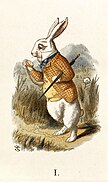Template:Did you know nominations/Down the rabbit hole (idiom)
Appearance
- The following is an archived discussion of the DYK nomination of the article below. Please do not modify this page. Subsequent comments should be made on the appropriate discussion page (such as this nomination's talk page, the article's talk page or Wikipedia talk:Did you know), unless there is consensus to re-open the discussion at this page. No further edits should be made to this page.
The result was: withdrawn by nominator, closed by Theleekycauldron (talk) 06:30, 11 June 2022 (UTC)
| DYK toolbox |
|---|
Down the rabbit hole (idiom)
- ... that going down a rabbit hole can be a guilty pleasure? Source: Unlike “time sink” or “time suck” or just plain “waste of time,” “falling down the rabbit hole,” when used in this sense, suggests not a total loss but a guilty pleasure.
- ALT1: ... that the idiom going down the rabbit hole has become a metaphor for distraction? Source: How did “rabbit hole,” which started its figurative life as a conduit to a fantastical land, evolve into a metaphor for extreme distraction?
- ALT2: ... that in 1865 Alice fell down a rabbit hole and experienced absurdities? Source: Wonderland. In this case, falling down the rabbit hole meant entering a strange and absurd alternate universe
- Reviewed: Template:Did you know nominations/Orange petunia
- Comment: open to other hook suggestions.
Created by Bruxton (talk). Self-nominated at 02:13, 3 June 2022 (UTC).
- Comment: I was going to review this, but I'll be damned if I will read two sources in their entirety to winkle out a couple of sentences of proof. How about supplying the reviewer with a concise source for your hook(s)?Georgejdorner (talk) 00:15, 5 June 2022 (UTC)
- Thanks for considering @Georgejdorner: I singled out the wording in the ALTs. I think it will make a fun DYK. Bruxton (talk) 03:18, 5 June 2022 (UTC)
- I'll review this.
| General: Article is new enough and long enough |
|---|
Policy compliance:
- Adequate sourcing:
 - See below.
- See below. - Neutral:

- Free of copyright violations, plagiarism, and close paraphrasing:

- Other problems:
 - See below.
- See below.
Hook eligibility:
- Cited:
 - See below.
- See below. - Interesting:
 - See below.
- See below.
| Image: Image is freely licensed, used in the article, and clear at 100px. |
|---|
|
| QPQ: Done. |
at least one inline citation to a reliable source, appearing no later than the end of the sentence(s) offering that factin the article per the eligibility criteria (this is of course trivial to fix).There are quite a few sourcing and copyediting issues. Starting with the former: Citing Alice's Adventures in Wonderland as a WP:Primary source is not adequate for the etymology of the phrase.
In the 20th centuryfails verification.
The idiom is often used to describe a person who is researching a topic on the internet or exploring new things on the webisn't what the cited sources say, it's your WP:INTERPRETATION of their uses of the phrase.
The term can also be used to describe an individual's psychedelic experience.is not remotely what the source says. The source says that Alice's Adventures in Wonderland has been interpreted as representing a psychedelic experience.
The idiom is also used to describe drug use, and the experience of an addict.again isn't what the cited source says, but your WP:INTERPRETATION of how the source uses the phrase.Moving on to copyediting: The first sentence should start with a non-bolded "Going" or "Falling" (take your pick) and
(idiom)should be removed.
English languageis used attributively (both in the WP:LEAD and one of the section headings) and should therefore have a hyphen. In the "Etymology" section, neither "novel" nor "was" should be followed by commas. Rather than putting Wonderland in quotation marks, link to Wonderland (fictional country).
interested in something, usually by accident; and oftenis an odd choice of punctuation with (what at least appears to be) a parenthetical phrase surrounded by a comma on one side and a semicolon on the other. Replace with two commas, two spaced en dashes, or two unspaced em dashes. It is not clear to me why the second paragraph in the "Etymology" section is not in the "English language uses" section instead, but perhaps there is a good reason. In the "English language uses" section,
Many websites are designed to keep users engaged. Websites which are most successful at keeping a user's attention are described as "rabbit holes".would read a lot better if condensed into a single sentence without needlessly repeating a lot of the information. This is a recurring problem with the article: it could be condensed a lot without losing any information.
falling down a rabbit hole often suggests that a person engaged in a guilty pleasure— tense mismatch. The "Pop culture" subsection only presents examples of the phrase being used without any analysis thereof. The section should either be rewritten to include analysis or removed entirely. See MOS:POPCULT about these kinds of sections. TompaDompa (talk) 10:30, 6 June 2022 (UTC)
- @TompaDompa: I withdraw the nomination. I thank you for the detailed review. Presently I am completing two GA nominations and trying to get several other languishing DYKs passed. I apologize for the time-suck. Bruxton (talk) 22:58, 6 June 2022 (UTC)

